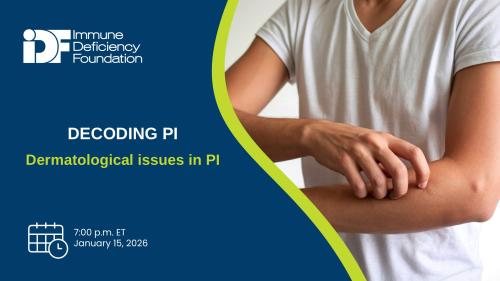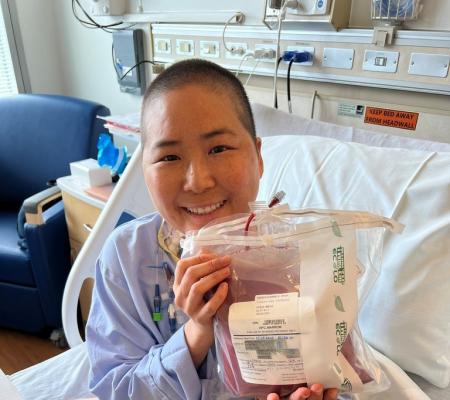
-
Understanding primary immunodeficiency (PI)

Understanding PI
The more you understand about primary immunodeficiency (PI), the better you can live with the disease or support others in your life with PI. Learn more about PI, including the various diagnoses and treatment options.
-
Living with PI
-
Addressing mental health
-
Explaining your diagnosis
- General care
- Get support
- For parents and guardians
-
Managing workplace issues
- Navigating insurance
-
Traveling safely

Living with PI
Living with primary immunodeficiency (PI) can be challenging, but you’re not alone—many people with PI lead full and active lives. With the right support and resources, you can, too.
-
Addressing mental health
-
Get involved

Get involved
Be a hero for those with PI. Change lives by promoting primary immunodeficiency (PI) awareness and taking action in your community through advocacy, donating, volunteering, or fundraising.
-
Advancing research and clinical care
-
Research Grant Program
-
Consulting immunologist
-
Diagnosing PI
-
Getting prior authorization
-
Clinician education
-
Survey research
-
Participating in clinical trials

Advancing research and clinical care
Whether you’re a clinician, researcher, or an individual with primary immunodeficiency (PI), IDF has resources to help you advance the field. Get details on surveys, grants, and clinical trials.
-
Research Grant Program
If you have a primary immunodeficiency (PI) that causes antibody deficiency, you could be at higher risk for chronic obstructive pulmonary disease (COPD).
COPD is a persistent but treatable lung disease that makes breathing difficult. Common symptoms of COPD include chronic cough, excessive production of mucus, shortness of breath, and trouble taking big breaths in and exhaling.
Typically, in persons without PI, COPD is caused by emphysema due to smoking or other environmental factors, an inherited condition known as alpha-1 antitrypsin deficiency, asthma, or chronic bronchitis.
In persons with severe antibody deficiency disorders such as common variable immunodeficiency (CVID) and X-linked agammaglobulinemia (XLA), COPD can develop due to bronchiectasis. Bronchiectasis occurs when the airways of the lungs become widened and damaged, usually due to recurrent pulmonary infections like pneumonia. Those with antibody deficiencies are more susceptible to bronchiectasis because they lack the antibodies needed to fight pneumonia.
“Antibodies are an important defense against the occurrence of pneumonias. Therefore, pneumonias are more common in patients with antibody deficiencies and other PIs. Prompt diagnosis of PI and treatment with antibody replacement, if indicated, can help prevent COPD due to bronchiectasis. Antibody replacement therapy dramatically decreases the frequency of pneumonias in antibody deficiencies and, therefore, can help prevent progressive bronchiectasis,” said Dr. Jack Routes, Medical College of Wisconsin Professor Emeritus of Pediatrics, Medicine, Microbiology, and Immunology and member of the Immune Deficiency Foundation (IDF) Medical Advisory Committee (MAC).
The treatment of COPD varies depending on why a person develops the disease. In asthma-related and other forms of COPD, patients frequently use inhaled bronchodilators and inhaled corticosteroids, said Routes.
“In patients with bronchiectasis, measures to improve the clearance of sputum from the lung should be instituted, such as chest physiotherapy. There are several types of chest physiotherapy, and the selection needs to be based on the severity of the bronchiectasis,” said Routes. “Depending on the severity of the bronchiectasis, other measures can be used, such as the use of prophylactic antibiotics.”
Exercise – and avoiding tobacco products – also aids in treating COPD.
“It is important to stay active if you have COPD. Walking and other forms of exercise can help in clearing mucous from the airways and lungs and help you to maintain a healthy weight,” said Routes. “Patients are strongly encouraged to exercise.”
Routes said that his practice is a referral center for PI patients, and he frequently sees patients with antibody deficiencies that lead to the development of COPD. Screening for bronchiectasis and COPD is routine.
“Patients with PIs, especially antibody deficiencies, are more prone to bronchiectasis and as a result COPD. Therefore, we screen all our patients with a significant PI with a CT scan of the chest and pulmonary function testing (PFT). A CT of the chest is the most sensitive method to detect bronchiectasis, whereas PFTs are the best test to detect airflow obstruction, which is the inability to get air out of the lungs,” said Routes.
“If you have a serious PI, make sure your doctors perform tests of pulmonary function and strongly consider a CT scan of the chest if not previously performed.”
Persons with COPD not diagnosed with PI but who have recurrent upper and lower respiratory tract infections like pneumonia should be screened for serious antibody deficiencies, said Routes, particularly deficits in IgG, IgA, and IgM levels. However, because they could be on long-term steroid treatment for COPD, which lowers IgG levels, they should consult a clinical immunologist who can differentiate between steroid-induced hypogammaglobulinemia or PI.
To learn more about COPD, visit the COPD Foundation.
Topics
Related resources
Sign up for updates from IDF
Receive news and helpful resources to your cell phone or inbox. You can change or cancel your subscription at any time.





The Immune Deficiency Foundation improves the diagnosis, treatment, and quality of life for every person affected by primary immunodeficiency.
We foster a community that is connected, engaged, and empowered through advocacy, education, and research.
Combined Charity Campaign | CFC# 66309




